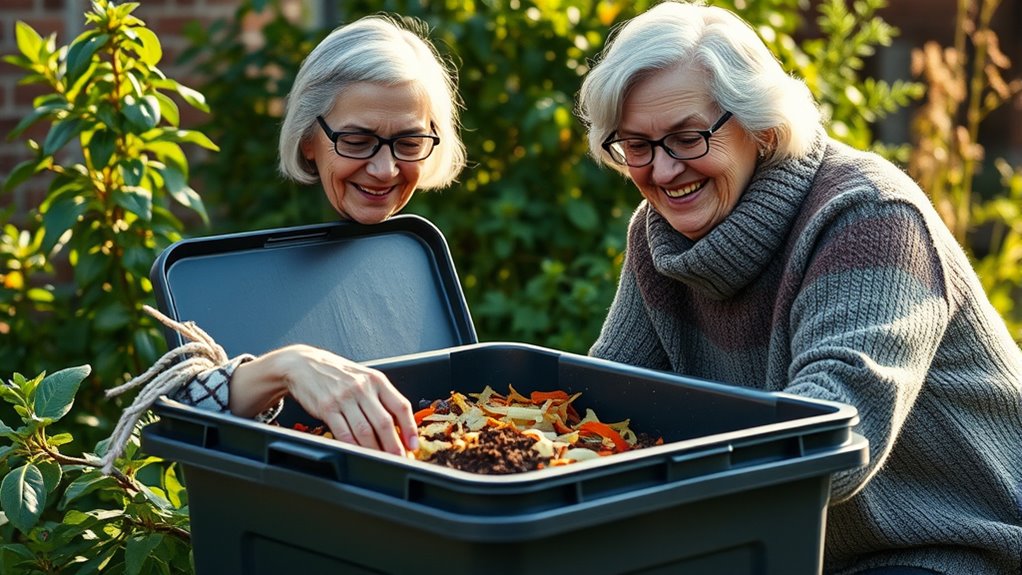Composting is a simple, eco-friendly way for seniors to reduce waste and improve their gardens. You can start with a small compost bin or even a worm bin indoors, using kitchen scraps like fruit peels and coffee grounds. Keep your system in a cool, shaded spot and maintain moisture levels. With a few easy steps, you’ll turn waste into rich soil and support the environment—learn more to make composting even easier!
Key Takeaways
- Start with simple composting methods like worm composting or backyard bins to reduce kitchen waste easily.
- Choose accessible, well-ventilated bins that fit your space and are easy to maintain.
- Use kitchen scraps such as fruit peels, coffee grounds, and eggshells, avoiding meat and oily foods.
- Keep the compost moist and aerated by turning bedding regularly for healthy worms and compost.
- Harvest nutrient-rich worm castings to enrich garden soil or potted plants, promoting sustainability and plant health.

Have you ever considered how composting can benefit your daily life as a senior? It’s a simple way to reduce waste, enrich your garden, and stay active. One of the easiest methods you might find appealing is worm composting, also known as vermicomposting. This process uses worms to turn kitchen scraps into rich compost, making it perfect for indoor or small-space setups. If you’re new to composting, start by choosing the right compost bin. When selecting a compost bin, look for one that’s durable, well-ventilated, and easy to access. A good bin should have enough space to hold your food scraps and bedding material while allowing airflow to prevent odors and pests. Many commercial options are designed specifically for worm composting, featuring a layered structure that makes harvesting worm castings straightforward.
Worm composting is especially suitable for seniors because it doesn’t require bending over large piles or heavy equipment. It’s low-maintenance, and as long as you keep the bin in a cool, shaded spot, your worms will thrive. When setting up your worm composting system, be mindful of the compost bin selection—choose one with a lid to keep out pests and maintain the right moisture levels. You’ll want to add bedding material like shredded newspaper or coconut coir to give your worms a comfortable environment. Then, you can start adding kitchen scraps like fruit and vegetable peels, coffee grounds, and eggshells. Avoid meat, dairy, and oily foods, which can attract pests and cause odors.
Maintaining your worm composting system is simple. Regularly check the moisture level—your bin should feel like a wrung-out sponge—and add bedding if it gets too dry. Turn the bedding gently with a small tool or your hand to aerate the environment and help distribute moisture. Over time, your worms will turn these scraps into castings, a nutrient-rich compost that can boost your garden’s health or be used in potted plants. Harvesting is easy because you can separate the worms from the finished compost and reuse the bedding and worms for the next batch.
Incorporating worm composting into your routine not only helps reduce waste but also keeps you engaged and active. With a little planning around compost bin selection and proper setup, you’ll find this method rewarding and manageable. Whether you have a backyard or just a small indoor space, worm composting offers a sustainable, practical way to contribute to environmental health and enjoy the benefits of homemade compost.
Frequently Asked Questions
Can Seniors Compost Indoors Without Odors?
You can definitely do indoor composting without odors. Just choose a small, airtight bin with a tight-fitting lid for indoor composting, which helps with odor control. Layering green and brown materials and turning the compost regularly also reduces smells. Using compost starters or adding baking soda can absorb odors. With these practices, you’ll keep your indoor composting odor-free and eco-friendly, making waste reduction simple and enjoyable for you.
What Are the Safest Composting Methods for Limited Mobility?
You want safe composting methods with limited mobility, so focus on vermicomposting safety and composting accessibility. Using a compact, sealed worm bin on a sturdy stand makes it easy to manage without bending or lifting heavy materials. Guarantee the bin has good ventilation to prevent odors and pests. Keep everything within reach, and consider tools with long handles for added convenience. This way, you can compost safely and comfortably, even with limited mobility.
How Much Maintenance Does a Compost Bin Require?
Think of your compost bin as a gentle garden guardian. It needs some daily attention—stirring or turning to keep the process lively—and regular monitoring. Durable compost bins stand strong against weather, and odor control techniques like adding browns help keep smells at bay. With a little care, your compost bin becomes a reliable partner in reducing waste, requiring only simple maintenance to stay effective and odor-free.
Are There Composting Options Suitable for Small Spaces?
If you’re wondering about composting options for small spaces, you’ll be glad to know that many composting bins are compact and perfect for limited areas. Look for countertop or tumbler compost bins, which are easy to place outdoors or inside. These options require minimal maintenance and fit well in apartments or small gardens. Incorporate these into your gardening tips to reduce waste effectively and enjoy fresh compost for your plants.
What Age-Friendly Composting Tools Are Available?
Ever wondered which age-friendly composting tools make waste reduction easier? You’ll find simple tools like compost bins with secure lids to prevent garden pests, and thermometers that help monitor compost temperature safely. These tools are designed for comfort and ease of use, reducing physical strain. With the right equipment, you can maintain an effective composting system, even if mobility is limited. Isn’t it time to start composting effortlessly?
Conclusion
Now that you know the simple steps, start composting with confidence. Embrace the process, enjoy the benefits, and reduce waste effortlessly. Keep it easy, keep it steady, and keep it green. With each composting effort, you contribute to a healthier planet, a cleaner community, and a more sustainable future. Remember, composting isn’t just about waste; it’s about making a positive difference—one small step at a time.









